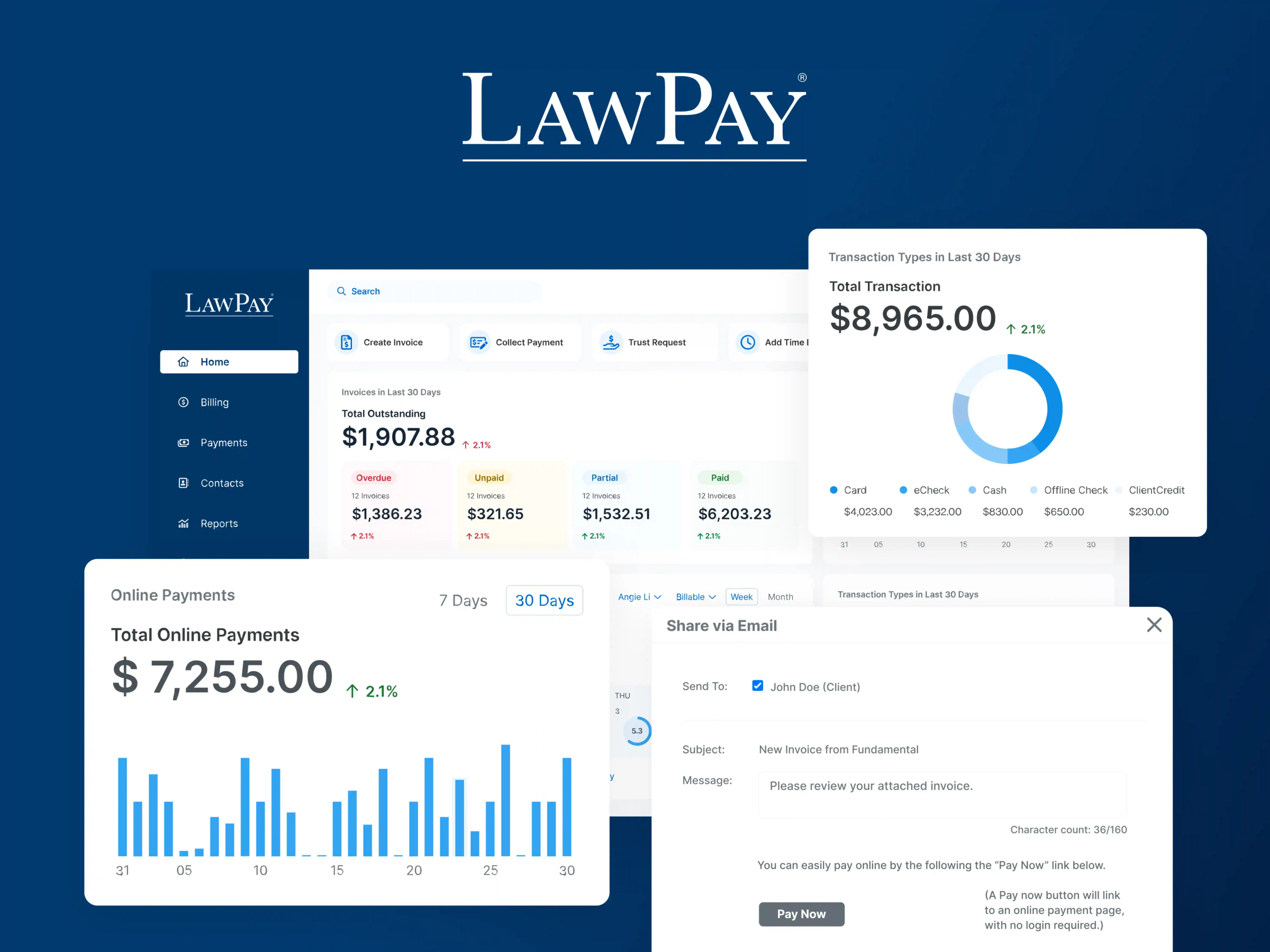Key takeaways
Double billing refers to charging twice for one unit of work. This act violates ABA Model Rule 1.5, an ethical rule governing clean billing practices, and can trigger ethics sanctions.
Most mistakes are workflow-based. Manual timers, unclear policies, and copy-paste errors can lead to unintentional billing issues.
Consequences include fee disgorgement, bar discipline, lost clients, and lasting reputational damage.
Standardized policies, passive time tracking, automated invoicing, and regular audits can help keep every invoice clean.
Clients trust you for sharp advice and honest invoices, but even the most diligent lawyer can accidentally double bill. What starts as an honest mistake can lead to fee disputes or bar complaints if you don't catch it in time.
Additionally, double billing, whether accidental or not, can significantly undermine client trust. To help firms stay above reproach, this guide will go over what double billing in law is, how it happens, and how to avoid it.
What Is Double Billing?
Double billing happens when a firm bills the same unit of time or expenses more than once or to more than one client, resulting in overcharges.
For law firms, this is an ethical red flag that directly violates the ABA Model Rule 1.5, which says legal fees must be reasonable and transparently earned. In other words, staying on top of billing can help your firm maintain both compliance and credibility.
What Are Examples and Common Causes of Double Billing in Law Firms?
Whether it stems from multitasking on the road or a copy-paste clerical slip, double billing can breach your professional obligations to the client.
Below are four real-world scenarios that illustrate double billing in law and how to fix the problems it causes.
Logging the Same Travel Hour for Two Matters
An attorney bills Client A for flight time, then takes a client call for Client B during the same flight and also logs that hour to Client B. Although only one hour of lawyer time was spent, they billed each client in full.
How to resolve: Establish a policy that travel time is billed to one matter only unless clients receive prior written disclosure and agree to a split rate.
Time-tracking software, like LawPay, can passively log activities in real time and review overlapping entries before billing. They help firms catch duplicate entries and stay compliant without extra admin work.
Reusing a Contract Template Without Disclosure
A lawyer drafts a master services agreement for Client C, then slightly modifies the document for Client D, but bills each client for the full drafting time. Because they only needed to do the bulk of the work once, charging both clients the full amount is effectively double billing.
How to resolve: Track time spent tailoring reusable work product separately from true “from-scratch” drafting. You can also offer a reduced or flat fee for subsequent adaptations and note template reuse transparently on the invoice.
To streamline this task, invoicing tools from solutions like LawPay let you log precise activity notes and durations. It also allows detailed descriptions, which make it easier to distinguish between original drafting and light revisions (so your invoices match your actual effort).
Duplicate Time Entries Caused by Administrative Error
Support staff exports time data from billing software and accidentally imports the same entries twice, doubling the hours on Client E’s invoice.
How to resolve: Implement routine pre-bill audits that compare billed hours to time-entry logs and set up software rules that block identical entries from posting without supervisory approval.
With legal billing software, firms can build invoices using detailed time logs, user-specific entry tracking, and easy-to-audit exports to minimize clerical mistakes. These features also help law firms catch duplicate entries more easily before invoices are sent.
Billing Two Clients for the Same Research Memo
A research memo on a niche statute benefits both Client F and Client G. The attorney bills eight research hours to each matter, even though they only performed the research once.
How to resolve: Either split the eight hours between the two matters or convert the work to a flat research fee disclosed to both clients. Consider creating a standardized billing policy that spells out how you allocate shared research. For accountability, the firm can require that a partner sign off before invoices are finalized.
Firms can also use LawPay to assign time entries by matter and activity type to more accurately split shared work and see duplicate logs before they appear on client invoices.
What Are the Consequences of Double Billing?
Double billing exposes your firm to potential ethics charges, hefty penalties, and a loss of client trust. Because state bars treat it as a serious, unethical billing practice for attorneys, sanctions can escalate quickly from fee disgorgement to suspension or even disbarment.
Potential consequences include:
Jeopardized client relationships
Disciplinary action by state bar associations
Disbarment
Legal penalties and fees
Damaged professional reputation
CLE
The Intelligent Practitioner - Client Communication, Cybersecurity, Finances & Intelligent Billing
Watch Now
How Can Law Firms Prevent Double Billing?
Law firms can prevent double billing by tackling their root causes with standardized procedures, automated tracking, and routine audits. Building a law firm billing guide sets the tone for accuracy, while passive time-tracking and invoicing tools eliminate duplicate entries.
1. Establish Standardized Billing Policies
A written law firm policy is your first line of defense against duplicate charges. Spell out exactly how staff should record time, down to required task descriptions, rounding rules, and which travel or research hours are billable.
Then, layer in internal review checkpoints to minimize the chances of duplicate entries or vague descriptions reaching the client.
Training can also help bring the policy to life. Walk every staff member through common double-billing pitfalls, and review the firm’s attorney billable hours chart to clarify acceptable increments.
Consistent refreshers ensure that all staff members follow the same playbook, keeping invoices accurate and clients confident.

2. Consider Alternative Fee Agreements
Shifting work from the billable-hour model to alternative fee arrangements like flat fees, capped fees, or value-based pricing removes a prime cause of accidental double billing (having to log every six-minute increment).
Clients appreciate the predictability, and your firm gains efficiency by focusing on deliverables rather than clock management.
3. Schedule Routine Billing Workflow Audits
A quick, systematic audit, monthly or before each billing cycle, helps catch duplicate entries long before an invoice reaches a client.
To start, you can pull a sample of time logs, compare them against matter files, and run automated reports that flag:
Overlapping timestamps
Identical task descriptions
Hours that exceed daily work-hour limits.
Assign a billing manager or rotating partner to own the checklist, document every discrepancy, and share findings at firm meetings. These audits surface root-cause patterns over time, so you can tighten procedures and keep every invoice spotless.
4. Implement Passive Time Tracking Tools
Passive time tracking hums along in the background, capturing emails, drafts, and calls so you don’t have to babysit a stopwatch. According to LawPay’s 2025 Legal Industry Report, 31% firms that use passive tracking say the tool saves them one to five hours every month.
Beyond efficiency, passive tracking can be a safety net against double billing. The system records each task once and automatically tags overlapping activities, preventing duplicate entries before they reach the pre-bill stage. Lawyers spend less time hunting for missing minutes, and clients receive invoices they can trust.
5. Automate Invoicing
With automated invoicing, entries flow straight from your timer to the bill, complete with duplicate-check rules, so no one is copying and pasting under deadline pressure.
And according to the data, these automated invoicing solutions are both popular and effective among lawyers. The 2025 Legal Industry Report shows that 80% of firms now rely on invoicing software, and over a quarter of them save up to five hours every month by letting the system handle formatting, math, and delivery.
Built-in validation tools flag overlapping entries or missing matter IDs before an invoice is sent, giving you a final quality-control gate with no extra clicks. Effective legal invoicing practices also reinforce transparency and improve client relations.
That transparency becomes even more critical as AI enters the billing equation, introducing new questions around what counts as billable work.
Create a More Efficient Billing Workflow with LawPay
Safeguards like clear policies, passive time tracking, automated invoicing, and regular audits work best when your tools talk to each other.
LawPay’s integrated legal billing software bundles passive time capture, duplicate-entry validation, and one-click invoicing into a single workflow. So, every hour is recorded once, reviewed once, and billed once.
To see the difference a unified system can make, sign-up for LawPay today.
Schedule a demo to see what LawPay can offer your firm.
Get a demo
FAQ About Double Billing
About the author

Justin FisherContent Writer
Justin Fisher is a content writer and SEO strategist for leading legal software companies, including MyCase, Docketwise, and CASEpeer, as well as LawPay, the #1 legal payment processor. He specializes in writing about emerging legal technology, financial wellness for law firms, and more.
